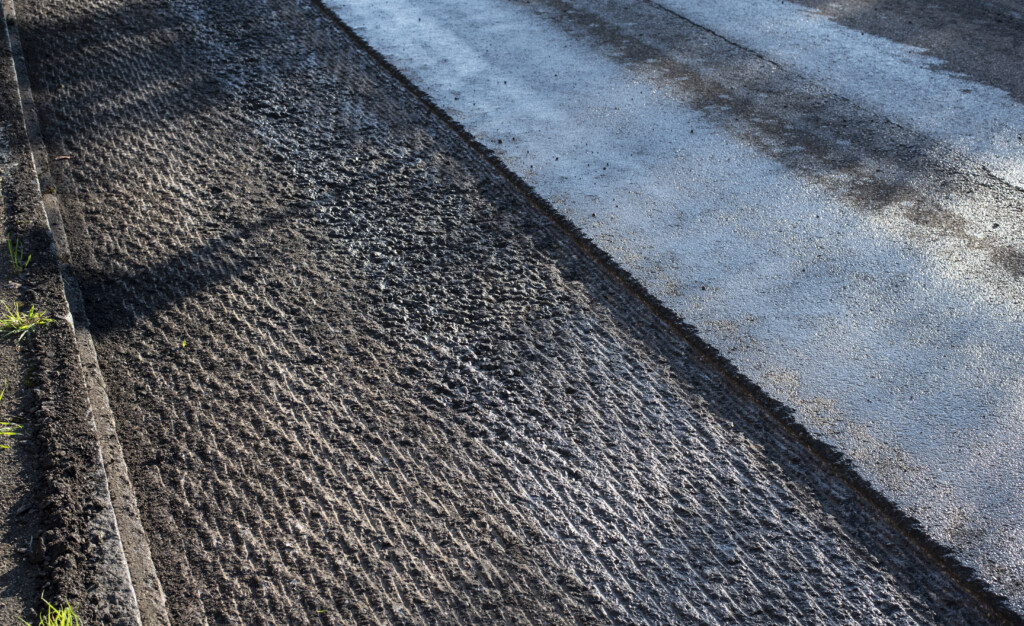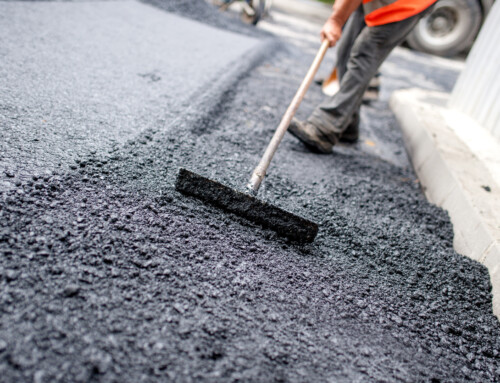
Asphalt is a paving material used for a wide variety of surfaces. From driveways to parking lots to roadways, asphalt is one of the most common paving materials. It’s versatile, durable, and relatively low maintenance.
If you’re thinking about getting asphalt pavement laid for the first time or having a surface repaved, the level of thickness matters. This information can help with the planning part of the project, as well as the implementation. Knowing how deep to dig and where underground water pipes, electrical wires, and utility lines are located can help you avoid mishaps.
Residential Asphalt
For a residential driveway, the asphalt needs to be able to support typical everyday vehicles and possibly heavy machinery on occasion. Residential asphalt should be at least 2-3 inches thick on top of the base layer. The base layer of asphalt should be made of up of granular aggregate and needs to be between 6 and 8 inches thick. This is if the soil underneath the base layer is rocky, sandy, or gravely.
If the soil underneath your paved area is clay or silt, there may need to be some deeper digging and preparation of the soil before the base layer is laid. Professional asphalt pavers will analyze the soil and plan accordingly to ensure your asphalt is laid successfully.
Commercial Asphalt
For commercial asphalt, meaning parking lots, driveways, or roadways, it needs to be able to support many different types and sizes of vehicles. It must also hold up to high volumes of traffic. For these reasons, asphalt needs to be at least 3 inches thick for commercial use.
Beneath those 3 inches of commercial asphalt should lie 8 inches of granular base aggregate for driveways and at least 6 inches for lots. The soil underneath the base layer should be well drained and rocky, gravely, or sandy.
Heavy Duty Commercial Asphalt
A heavy duty commercial driveway or lot would be a situation where heavy trucks and machinery will be driving frequently. Loading docks, industrial plants, mining areas, and any other paved area that will see a high volume of heavy duty traffic needs to have an asphalt layer of at least 4-7 inches with more specifically placed layers beneath and within the asphalt itself. There should be at least 6 inches of asphalt over 3 inches of base layer for any heavy duty commercial pavement.
What Can Go Wrong if Asphalt Is Not Thick Enough?
The thickness of asphalt pavement makes a difference in how long it lasts. There are a variety of problems that can occur if the base layers and asphalt layers are not thick enough to hold up to the size, weight, and volume of traffic that uses the surface. Problems may include:
- Cracking. Asphalt that is too thin may crack under the weight of heavy vehicles. Once cracks develop they can allow moisture to leak through and disrupt the base layer underneath.
- Buckling. The asphalt may buckle in large chunks under the weight of traffic. This can cause some pieces of asphalt to raise up and others to sink down, making the entire surface uneven.
- Low spots. Asphalt that is too thin can develop low spots where water will puddle and erode the pavement.
- Potholes. Severe low spots can become potholes that may even be capable of causing damage to vehicles.
- Drainage problems. The above problems can all lead to lack of proper drainage of an asphalt surface and the ground beneath.
Trust Your Asphalt Pavement to the Professionals
If you want to ensure your asphalt paving project is a success, hire the professional pavers of TopWest Asphalt. With over a decade of experience in the asphalt paving industry, we know how thick the base layer and asphalt needs to be to ensure your surface is even and stays that way. We provide a wide range of asphalt paving services from residential to commercial.
Call 604-755-0300 or contact us today to request a free estimate.





